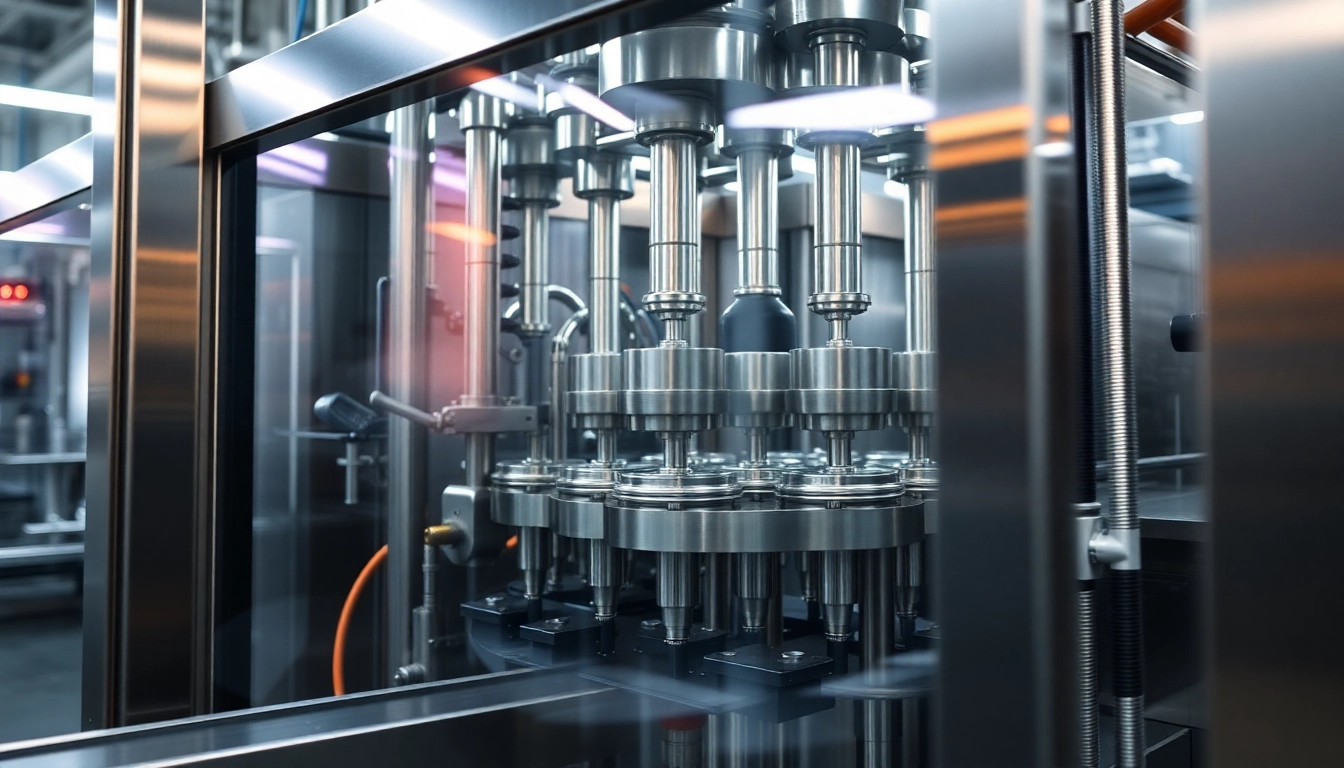Understanding Filling Machines
What is a Filling Machine?
A filling machine is a type of equipment used primarily in manufacturing and packaging industries for dispensing precise quantities of liquids, powders, pastes, or granular products into containers such as bottles, jars, pouches, and boxes. Its main function is to automate the otherwise manual task of filling packages, ensuring speed, accuracy, and reduced wastage. In contemporary production lines, filling machines are pivotal to enhancing operational efficiency, offering substantial return on investment.
Types of Filling Machines
Filling machines come in various types and configurations, each designed to accommodate a different category of products and packaging. The primary categories include:
- Gravity Fillers: Ideal for filling lighter liquids, gravity fillers work by using gravity to let the product flow from a reservoir through a nozzle and into the container.
- Piston Fillers: These machines use a piston mechanism to dispense a specific volume of liquid in a controlled manner. They are suitable for a wide range of products, including thick pastes and viscous liquids.
- Vacuum Fillers: Employing vacuum pressure, these machines draw liquids into containers, making them ideal for foaming or frothy products.
- Pump Fillers: These machines use a pump to control the flow of liquids into containers and are particularly effective for viscous materials.
- Rotary Fillers: Used for high production speeds, rotary fillers utilize a rotating platform to fill containers as they move through the machine.
Choosing the Right Filling Machine
Selecting the appropriate filling machine involves evaluating various factors, including the type of product, the container shape and size, production volume, and the required filling accuracy. It’s vital to conduct a thorough assessment of the production process to ensure you choose a machine that integrates seamlessly into your workflow. Considering automation levels can also influence your decision since some processes may require manual fillers, while others benefit from fully automated systems.
Benefits of Using Automated Filling Machines
Increased Efficiency and Speed
Automated filling machines significantly enhance production line efficiency by drastically reducing the time it takes to fill containers when compared to manual methods. For instance, while a manual process may take several minutes per container, automated systems can typically fill dozens, if not hundreds, within the same timeframe, leading to improved throughput and capability to meet high demand.
Cost Effectiveness
Investing in a filling machine can lead to substantial cost savings over time. By reducing the need for manual labor, companies can streamline costs associated with staffing and training. Additionally, improved filling accuracy minimizes product wastage, further contributing to lower operational expenses.
Improved Accuracy in Filling
Precision is paramount in filling processes, especially in industries like pharmaceuticals and food and beverage, where dosage matters. Automated filling machines are designed to measure and dispense product with high accuracy, significantly reducing overfills and underfills that can lead to costly compliance issues and waste.
Industries Served by Filling Machine Suppliers
Food and Beverage Industry
The food and beverage sector is one of the largest users of filling machines. From juices and sauces to snacks and frozen foods, these machines handle a diverse range of products, ensuring they meet stringent hygiene and safety standards. Companies require filling machines that maintain the integrity of the product while facilitating quick turnaround to keep up with consumer demands.
Cosmetics and Personal Care
For cosmetics and personal care products, filling machines need to accommodate various viscosity levels and container shapes. This industry often requires customization of filling systems to handle creams, lotions, and gels, further emphasizing the need for flexible and high-quality filling solutions.
Chemicals and Adhesives
Filling machines serve another critical role in the chemical sector—coating formulations, adhesives, and industrial chemicals. This industry typically requires robust machines capable of handling thicker products and ensuring precision and safety, as the products handled may be corrosive or hazardous.
How to Choose a Reliable Filling Machine Supplier
Evaluating Supplier Credentials
Before partnering with a filling machine supplier, it’s essential to evaluate their credentials and experience. Consider past projects, customer testimonials, certifications, and compliance with industry standards to ensure reliability and quality in their offerings.
Assessing Customer Support and Service
Excellent customer service is vital. A reputable supplier should offer support through the purchasing process and beyond, including installation, training, and maintenance. Understanding your supplier’s commitment to post-sale service is crucial in ensuring uninterrupted production operations.
Comparing Product Offerings
When selecting a filling machine supplier, it is essential to familiarize yourself with the range of products they offer. Diverse product lines indicate that a supplier can meet a range of needs, whether you require standard models or specialized machines tailored to your production line requirements.
Future Trends in Filling Machine Technology
Integration with IoT and Smart Technology
The future of filling machines lies in the integration of IoT (Internet of Things) technology, allowing for smarter, more connected operations. This technology can enable real-time monitoring and data collection, empowering managers to make data-driven decisions that enhance efficiency and reduce downtime.
Sustainability Practices in Manufacturing
As industries face mounting pressure to adopt sustainable practices, the filling machine sector is actively exploring eco-friendly materials and energy-efficient technologies. Enhanced designs that minimize waste and maximize energy efficiency will be sought after, paving the way for a greener future in production processes.
Customization for Specific Needs
As the demand for niche products grows, so too does the necessity for customized filling solutions. Suppliers will need to offer bespoke machines tailored to specific product characteristics and business processes to maintain competitive edge. Customization can involve modifications in speed, accuracy, and machine size, addressing the unique challenges of different manufacturing environments.
In summary, the right Filling Machine Supplier plays an integral role in the overall efficiency and effectiveness of production lines across various industries. By understanding the various types of filling machines, their benefits, and future trends, businesses can make informed choices that enhance productivity, reduce costs, and ensure they stay ahead in a competitive market.
